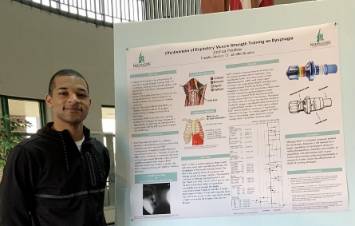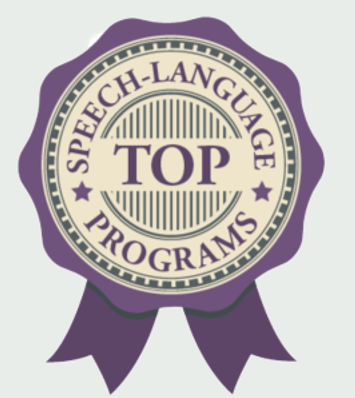SLP Undergraduate Program
For more information about degree requirements, visit the NSU catalog.
Student Learning Outcomes
- Demonstrate depth and breadth of understanding of fundamental concepts of speech-language pathology.
- Teach effective speech-language pathology lessons that can lead learners to a deep understanding of concepts within speech-language pathology.
- Focus on the academic, clinical and research foundations needed for a career in communication disorders.
- Prepare the student to make decisions and to take appropriate, thoughtful action to identify and to meet the communication needs of individuals and families.
There is a greater variety of opportunities available to speech pathologists than virtually any other university degree.
- Speech pathologists work in a variety of settings: hospitals, rehabilitation facilities, skilled nursing facilities, clinics, private practices, home health, and schools.
- Speech pathologists work with clients to address a variety of needs: pronunciation, language, stuttering, voice, swallowing and other feeding concerns.
- Speech pathologists provide alternative communication strategies for clients who have had a laryngectomy, for those who are deaf or hard of hearing, for those with a progressive disease, and for those who have suffered from a debilitating stroke or trauma.
- Speech pathologists work with individuals with a variety of diagnoses: autism, aphasia, apraxia, cleft palate, dementia, Parkinson’s disease, and many, many others.
- With a Speech Language Pathology B.S.S.L.P. you can apply to graduate school for a Speech Language Pathology M.S. or a Doctor of Audiology degree (AuD). You may also practice as an Speech Language Pathology Assistant(SLP-A).
We have an Accelerated Degree Plan that allows students to complete the Bachelor’s and Master’s degrees in five total years, instead of the usual six!
Note: Please refer to Accelerated Bachelor’s to Master’s Degree Program for complete information concerning the minimum requirements of the Accelerated Degree Program (ADP). The Speech-Language Pathology, M.S. degree requires a minimum grade of B. Refer to the current Graduate Catalog for master’s degree requirements.
IMPORTANT:
- Students admitted to the Accelerated B.S.S.L.P. Speech-Language Pathology to M.S. Speech-Language Pathology degree program will complete up to 18 hours of graduate level credit to apply toward both the undergraduate and graduate degrees.
- Students may not receive credit toward both the undergraduate and the paired graduate-level course. A student completing an undergraduate course and the paired graduate-level course will only receive credit for one course toward the bachelor’s degree.
- A minimum grade of B is required for all 5000 level graduate courses.
- Students who do not follow the approved degree plan may become ineligible to continue in the accelerated degree program.
- Prior to completing the undergraduate degree, if the undergraduate GPA, graduate GPA and/or overall GPA fall below a 3.00, the student becomes ineligible to continue in the ADP.
- Students may withdraw from an approved accelerated degree pathway. Graduate credit hours completed prior to the student withdrawing or becoming ineligible to continue in the ADP apply toward the undergraduate degree only.
Degree Available At
- Tahlequah
- Muskogee
Transferring to NSU?
Make your transition to NSU as smooth and seamless as possible.
Visit Transfer Student Services for more information.
Career Services
PROGRAM CHAIR
Bachelor of Science (B.S. in Speech-Language Pathology)

What can I do with a degree in Speech-Language Pathology?
There is a greater variety of opportunities available to speech pathologists than virtually any other university degree.
- Speech pathologists work in a variety of settings: hospitals, rehabilitation facilities, skilled nursing facilities, clinics, private practices, home health, and schools.
- Speech pathologists work with clients to address a variety of needs: pronunciation, language, stuttering, voice, swallowing and other feeding concerns.
- Speech pathologists provide alternative communication strategies for clients who have had a laryngectomy, for those who are deaf or hard of hearing, for those with a progressive disease, and for those who have suffered from a debilitating stroke or trauma.
- Speech pathologists work with individuals with a variety of diagnoses: autism, aphasia, apraxia, cleft palate, dementia, Parkinson’s disease, and many, many others.

Important details about the NSU SLP Program:
- NSU students take the general education courses in Tahlequah, although some general education courses are available online.
- The NSU Speech-Language Pathology courses are taught face-to-face.
- The first four undergraduate SLP courses are taught in Tahlequah.
- All other SLP courses are taught in Muskogee where the SLP Program is based.
- All undergraduate SLP courses are taught on Tuesdays and Thursdays.
- All NSU SLP courses are taught by licensed and certified speech pathologists. That is very important. Some other programs are taught by individuals who have never practiced speech pathology because they are not speech pathologists.
- We have an Accelerated Degree Plan that allows students to complete the Bachelor’s and Master’s degrees in five total years, instead of the usual six!
- The NSU SLP Program is a cohort program in that all SLP students travel through the program together – taking the same courses at the same time, following the course sequence. This has several advantages. The instructors know what course each student has already completed, allowing the content of each course to build on the content of the previous courses. Cohorts contribute to the strength of the relationships among the students. The groups become close knit and strongly support one another.
- The NSU SLP faculty strives to build professionalism in our students. Academic and clinical strength are incredibly important, but these skills must grow and develop within attitudes and behaviors that reflect professional maturity.

